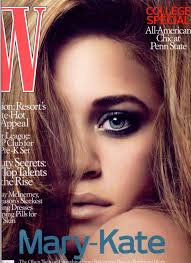Magazines are a pivotal medium force in society. They depict one's personality, solidify gender differences, and present an educational pop culture reference for society. They are an outlet for creativity and provide a present snapshot of culture for consumers.
Magazines illuminate one's personality. If one is seen reading Vogue, we can infer they are sophisticated, older, and fashionable. If one reads Cosmopolitan, they are young, hip, and edgy. If one reads W, they are an avid fan of fashion and photography. If one reads US Weekly, they love being in-the-know and gossiping. In addition, if one reads Allure or Elle, they love commercialized fashion (more commercial than Vogue or W) and enjoy beauty tips and feminine essentials.
Magazines provide an outlet for creativity and allow the reader to escape into an augmented reality. In actuality, magazines are extremely similar to the internet. When one reads them they are taken into another hemisphere, one filled with tips, fashion, beauty, and editorial columns. They are the bibles of pop culture, the house for advertisements, and the catalyst for celebrity and socialite news. The fashion spreads a reader in W or Vogue reads is an escape from reality. They are taken into a fictional world with unbelievable clothes and locations. Moving forward, the role of creative directors at magazines has become much more important recently. Traditionally, the Chief Editor has controlled the creative direction of the magazine. However, recently there has been two additions to the executive team: a creative director and fashion editor (for fashion driven magazines). Together, these three form the core of the magazine brand. They create editorial columns, edit fashion shoots, and control the brand image of the magazine.
Magazines are a significant medium of pop culture. These glossy pages provide a snapshot of the pop culture, fashion, or current issues that are being discussed in society. For example, Vogue has a political section, W has an economics section (surprisingly), and Vanity Fair has a current issues section. Although these publications are perceived as fashion magazines, in reality, they provide a snapshot of the political, social, and economical issues in society. Although they might not be the New York Times, they fuse together fluffy issues (fashion) and meaty issues (politics, economics, etc.). They are tangible snapshots, versus virtual references. They are books of culture, which can guide consumer preferences, brand awareness, or consumer perception of pop culture. For example, US Weekly keeps readers up to date on celebrity gossip (whether it's true or not). On October 13th, in class we discussed Murdock, McCron, & Puresehouse's piece called MediaViolence & Tabloids. In the piece, he discussed how tabloids appeal to the lower class. I throughly disagree with this stance--everyone reads tabloids, regardless of their economic background. In addition, they discuss the power of journalism, and the negative effects it has on the population. I would argue that journalism has many more ripples of positivity than negativity.
Magazines are a significant medium of pop culture. These glossy pages provide a snapshot of the pop culture, fashion, or current issues that are being discussed in society. For example, Vogue has a political section, W has an economics section (surprisingly), and Vanity Fair has a current issues section. Although these publications are perceived as fashion magazines, in reality, they provide a snapshot of the political, social, and economical issues in society. Although they might not be the New York Times, they fuse together fluffy issues (fashion) and meaty issues (politics, economics, etc.). They are tangible snapshots, versus virtual references. They are books of culture, which can guide consumer preferences, brand awareness, or consumer perception of pop culture. For example, US Weekly keeps readers up to date on celebrity gossip (whether it's true or not). On October 13th, in class we discussed Murdock, McCron, & Puresehouse's piece called MediaViolence & Tabloids. In the piece, he discussed how tabloids appeal to the lower class. I throughly disagree with this stance--everyone reads tabloids, regardless of their economic background. In addition, they discuss the power of journalism, and the negative effects it has on the population. I would argue that journalism has many more ripples of positivity than negativity.
Overall, magazines illuminate ones personality, provide an outlet for creativity, and are a significant medium of pop culture. This also connects to our reading on October 12th. Croteau and Hoyne present an "encoding-decoding model" in which the marketer encodes a message and the consumer reads the message through a medium. Magazines are the medium for a variety of messages including advertisements, fashion trends, celebrity news, and beauty essentials. Moreover, the roots of societal mediums was transformed by the printing press (similar impacts at the telegraph mentioned in class) and the ability for information to be distributed worldwide. Although rumors are swirling around the death of the magazine industry, the internet boom, and the lack of advertising dollars companies are allocating, hopefully the publication world will pull through and prevent the death of this pivotal medium in society.
Thoughts?
MM
Thoughts?
MM








No comments:
Post a Comment